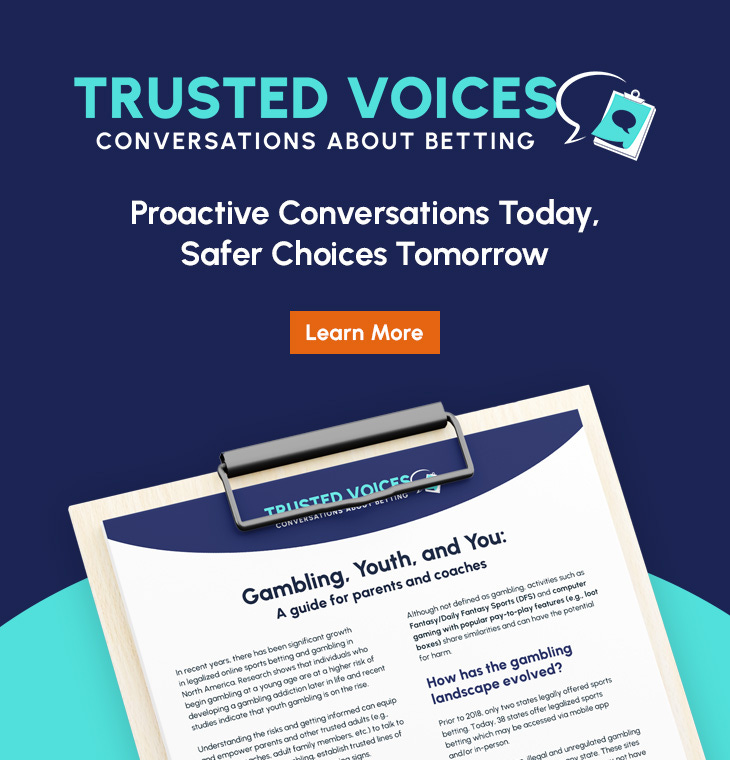The Takeaway: The Age For US Sports Betting Is Actually 18, Whether You Like It Or Not
Options outside of regulated sportsbooks for people under 21 are plentiful. Gambling news roundup: Tennessee fines offshore operators; Drake has lost $8 million gambling this month.
Every Thursday in The Takeaway, The Closing Line provides commentary on trends and news in the gambling industry.
First things first: This is not a call to lower the legal age for regulated sports betting in the U.S. That would be a terrible idea.
It’s a plea to recognize that stopping anyone between the ages of 18 and 21 from betting on sports is more of a theoretical construct than something laws are stopping in reality. That’s not much different from other things with minimum ages, like drinking and smoking; there’s always a way to get around the rules.
If you read this space, you know there is a lot of gambling that goes on in the gray/unregulated/quasi-regulated space. It’s important to know and realize that once someone turns 18, they have access to a lot of gambling. And maybe it hasn’t been said out loud enough.
Ifrah Law has been at the center of advancing iGaming in the U.S., shaping groundbreaking legislation, leading precedent-setting cases, and guiding clients that span the iGaming ecosystem through every phase of their business journey. Learn more at IfrahLaw.com.
If you are the parent of an 18-year-old, here’s a sampling of where they can bet on sports:
Offshore: Most offshore sportsbooks will take your bets once you turn 18; a perusal of the terms and conditions of major offshore books like Bovada, BetUS, and BetOnline all confirm this. Bovada puts it in their “Responsible Gaming” page:
Crypto sportsbooks serving the US generally fall into the offshore category, and the gambling age is typically 18.
Daily fantasy sports: The age to play daily fantasy sports of almost all types is generally 18, whether it’s against the house or peer-to-peer. Functionally, most fantasy pick’em is no different from placing a parlay at a sportsbook. The legality of fantasy pick’em is more or less settled, barring a major state choosing to get involved.
Eighteen-year-olds can play DFS largely because of FanDuel and DraftKings, which codified it in fantasy sports laws across the country. And they also offer their traditional DFS contests and peer-to-peer pick’em to 18-year-olds.
In some states, the age for DFS can be higher, either 19 or 21.
Prediction markets/sports event contracts: The age to bet on sports via Kalshi, Robinhood and Crypto.com is 18 in all 50 states.
Sweepstakes sportsbooks: We’re not having a debate today about the legality of sweepstakes. For this post’s purposes, suffice it to say that you can use some sweepstakes sportsbooks at 18. And while many people can and do use it for free, you can also use most of them as a proxy for real-money sports betting.
Some companies in this space set the minimum age at 21, like Novig. (VGW also raised its minimum age to 21, but it only offers casino and poker, not sports.)
This post is not about making a call to change all of this; the genie isn’t going back in the bottle. To think we’ll get sweeping policy changes on age restrictions in any of these sectors is foolhardy.
What we can do is realize that responsible gambling and problem gambling for young people is a complex beast. It’s not just about concerns from betting at a sportsbook, but I think that’s how it’s largely viewed today in the US. While legal sportsbooks dominate, all these other sectors are also sizable or growing. Kalshi launched sports betting early this year, and trading volume on sports has already eclipsed a billion dollars. DFS as an industry generates in excess of a billion dollars of annual revenue.
Everything I listed above sits somewhere on the sports betting spectrum. And here’s where it can get a bit dangerous, especially with younger people who may not know better:
Some cohort of people at Kalshi and Robinhood think they are “investing,” “trading,” or “predicting” instead of gambling.
While there’s unquestionably skill involved in DFS of all types, some people believe they are playing a game of skill and not gambling. I think most people probably realize they are gambling, but not everyone.
The operators in these spaces run the gamut on how they approach RG and gambling harm — from nothing, to the bare minimum, to doing more than they have to do. Credit where it’s due; PrizePicks and Underdog, in particular, have made investments in RG and take it seriously. They could do almost nothing, and no one would bat an eyelash.
All I want to point out today is that the options for people 18 to 21 to gamble on sports are not endless, but they are pretty robust. When we think about the potential harm from sports betting for young people, everything on the spectrum needs to be considered. It’s not something that fits in a nice, neat box, but it’s the reality and the future we need to come to terms with.
Want to sponsor The Closing Line?
You can email dustin@closinglineconsulting.com for more information.
FanDuel’s Trusted Voices: Conversations About Betting is designed to equip adults, including parents and coaches, with tools and resources to talk to young people about gambling, including information on warning signs, risks and proxy betting. The program is led by retired professional basketball player Randy Livingston and his wife, basketball agent Anita Smith, who share their personal stories related to problem gambling, with the hope of preventing others from experiencing similar harms. Learn more and join the conversation here.
Gambling news roundup
Illegal Offshore Sportsbooks LOWVIG, Sportsbetting.AG Fined $50,000 Each By The SWC (press release): “The Sports Wagering Council (SWC) fined illegal offshore sportsbooks Lowvig and Sportsbetting.ag $50,000 each for operating illegally in Tennessee after the entities failed to comply with cease and desist letters issued in April. Sportsbetting.ag and Lowvig are the sixth and seventh illegal operations to be fined by the SWC as the state agency continues its work to shut down illegal sportsbook operators in Tennessee. Eliminating illegal sportsbooks from Tennessee is a primary focus of the SWC with its mission to protect the public interest of Tennessee through a safe and regulated sports betting environment.”
“Tennessee is the largest online-only sports betting market in the U.S. with more than $5 billion wagered in Tennessee so far this fiscal year, and licensed sportsbooks in Tennessee go through a rigorous process before they have the privilege to do business here,” SWC Executive Director Mary Beth Thomas said. “In contrast to our legal sportsbooks, illegal operators do not offer any of the same consumer protections the law requires of licensed entities, and if a consumer continues to do business with an illegal sportsbook, they are giving away their personal and financial information to criminals.”
People Are Calling Drake “Out Of Touch” For Posting A Screenshot Of His Multimillion-Dollar Gambling Losses In The Past Month, And It’s Pretty Wild (BuzzFeed): “On Wednesday, Drake — whose net worth is reportedly around $250 million — posted a screenshot of his wagering plans for Game 6 of the NBA finals this week, having placed a total of $800,000 on the Oklahoma City Thunder to win. An hour later, he followed up by sharing a screenshot of his losses in the past month, which added up to $8,253,686. The screenshot also showed that he’d seemingly wagered a sum of $124.5 million in that time, too.”
Ontario Turning Up The Heat on Offshore Sports Betting, Casino Sites (Covers): “Canada’s most populous province is now increasingly trying to make life difficult for those offshore and unregulated holdouts, seeking to sever their relationships with advertising partners, banks, and payment processors.
Those efforts were highlighted Wednesday at the Canadian Gaming Summit in Toronto, via comments by several officials who are well-positioned to know what’s happening.”
“The market's matured enough now that people have had an opportunity, and if they're not going to go through the door, it's time that they stop playing in our market,” Ontario Attorney General Doug Downey said. “And I think [iGaming Ontario], [the Alcohol and Gaming Commission of Ontario] and the responsible gaming people all understand that that's really important. So I think you'll see a little bit more aggressive approach in that space.”
How a Vegas Billionaire’s Plan to Bring Casinos to Texas Went Bust (Texas Monthly, paywall): “The town hall was proving to be yet another disaster for the Las Vegas Sands Corporation. The Irving Convention Center was jammed with several hundred angry North Texans. They held signs that read “Don’t Vegas My Irving” and circulated flyers warning that “predatory gambling” breeds crime, failed marriages, and addiction. Three days later, on March 17, a city commission was set to consider a contentious zoning change. It would permit Sands to someday build a ‘destination resort’ complex on land adjacent to the site of the demolished Texas Stadium, the home of the Dallas Cowboys until 2008. The proposal also conspicuously allowed for a casino as part of the resort. It was a peculiar concept. Other than two Native American–owned properties in far-flung parts of the state, casinos are banned in Texas. But Sands was planning for the future, when it hoped the Legislature would ask voters to amend the state constitution to allow for gambling—a future it was furiously trying to make a reality.”
The Scheme That Broke the Texas Lottery (New Yorker): “As Nettles had predicted, on April 22nd, someone won the ninety-five-million-dollar jackpot. Grief, the Texas Lottery director, soon acknowledged that ‘purchasing groups’ had been involved. The bulk buy was recognized as unfair but legal; the lottery paid out the prize money, which, after taxes, amounted to nearly fifty-eight million dollars. (The Houston Chronicle eventually reported that a London-based gambling syndicate had bankrolled the operation.) Two years later, it has become a full-blown scandal. The Texas Rangers have been called in to investigate what Dan Patrick, Texas’s lieutenant governor, has called “the biggest theft from the people of Texas in the history of Texas.” (No criminal charges have been filed; the lawyer that represents Rook TX, the Delaware L.L.C. that claimed the jackpot, has said that ‘all applicable laws, rules and regulations were followed.’)”
$1B North Carolina casino on track after years of delays (WSOC): “The Catawba Nation says it’s less than a year away from opening the first piece of its long-awaited casino resort in Kings Mountain. The Catawbas and Delaware North, the tribe’s operating partner on the project, gave a tour of construction progress on June 17. An introductory phase of the casino resort is on track for a March opening, project leaders said. That phase will include 1,350 slot machines, 22 table games, a 40-seat restaurant, a bar and sports-betting kiosks. It will replace the temporary casino the Catawbas have operated since 2021 at the site off Interstate 85’s Exit 5.”










